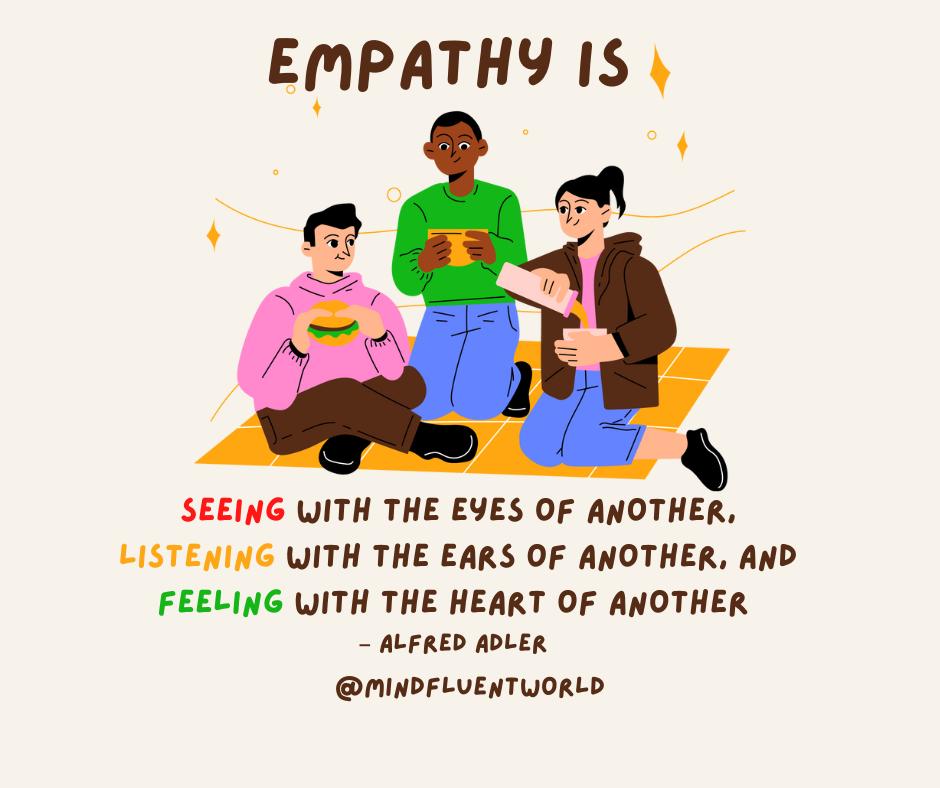
The power of Empathy
What is empathy, how does it help us transform our lives for better?
The ability to understand and share the feelings of another person is known as empathy. It is a crucial aspect of human interaction and is essential for building and maintaining healthy relationships. Empathy allows us to connect with others on a deeper level and helps us to show compassion and understanding towards their experiences and emotions.
Empathy is not just about feeling sorry for someone or feeling their pain. It is about genuinely putting ourselves in someone else’s shoes and trying to understand their perspective. This means actively listening to them, asking questions, and making an effort to understand their thoughts and feelings.
Developing empathy requires practice and can be difficult at times, especially when we may not agree with someone or their actions. However, it is an important skill that we can all learn and improve upon.
It is a crucial component of emotional intelligence and is essential for building strong relationships, resolving conflicts, and creating a sense of connection and understanding within a community.
There are two main types of empathy: cognitive empathy and emotional empathy. Cognitive empathy involves understanding another person’s perspective and being able to take their point of view. It is important for effectively communicating and resolving conflicts. Emotional empathy involves feeling and experiencing the emotions of another person. This type of empathy allows us to feel compassion and concern for others, and is crucial for building strong relationships and showing support.
How to develop a habit of empathy?
Empathy can be developed and strengthened through practice and exposure to diverse perspectives. One way to do this is through active listening, which involves paying attention to what the other person is saying and expressing understanding and validation of their feelings. It is also important to be open to hearing and learning about different perspectives and experiences, and to try to put ourselves in other people’s shoes. Here are some ways to cultivate empathy in our daily lives:
- Practice active listening: Pay attention to what the other person is saying and try to understand their perspective. Avoid interrupting or jumping to conclusions;
- Ask questions: Show an interest in the other person and ask open-ended questions to learn more about their thoughts and feelings;
- Put yourself in their shoes: Imagine how you would feel in the same situation and try to understand their emotions;
- Empathize with others: Show compassion and understanding towards the other person’s experiences and emotions;
- Validate their feelings: Let the other person know that their feelings are valid and that you understand how they feel.
Empathy is not the same as sympathy, which involves feeling sorry for someone but not necessarily understanding their perspective or feelings. It is important to distinguish between the two, as empathy allows for a deeper level of understanding and connection, while sympathy can often be seen as superficial or patronizing.
The role of empathy is important in all aspects of life, but it is particularly crucial in professional settings. In the workplace, empathy can lead to better communication, more effective problem-solving, and a positive work culture. It can also improve customer service and lead to stronger relationships with clients or customers.
It is something that in our time is more appreciated than it has been before. Empathy is different from sympathy. Sympathy is someone is in pain or someone has a strong feeling and you try to connect with them on that. But empathy is where you can step into their shoes and you can feel as they feel. And so it’s stronger than just sympathy.
The well-known author, Adam Grant, believes that empathy can also lead towards compassion, which is the ultimate feeling that moves us from the state of feeling and understanding, to the state of acting and helping others. In other words, empathy helps develop compassion, which in turn lets us act upon, and offer our full support to others.
In summary, empathy is a valuable skill that allows us to understand and connect with others on a deeper level. It is essential for building strong relationships, resolving conflicts, and creating a sense of community and understanding. By practicing active listening and being open to diverse perspectives, we can develop and strengthen our empathy skills and improve our relationships with others.
Empathy is a powerful tool that can help us to build stronger, more meaningful interactions with others. By showing compassion and understanding towards others, we can create a more empathetic and compassionate world. So the next time you interact with someone, try to put yourself in their shoes and practice empathy – it will not only benefit them, but also enrich your own life.

